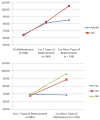Association between childhood maltreatment and adult emotional dysregulation in a low-income, urban, African American sample: moderation by oxytocin receptor gene
- PMID: 23786688
- PMCID: PMC4363139
- DOI: 10.1017/S0954579411000162
Association between childhood maltreatment and adult emotional dysregulation in a low-income, urban, African American sample: moderation by oxytocin receptor gene
Abstract
The ability to effectively regulate emotions and a secure attachment style are critical for maintaining mental health across the life span. The experience of childhood maltreatment interferes with normal development of emotional regulation and dramatically increases risk for a wide range of psychiatric disorders in adulthood. The central nervous system oxytocin systems are critically involved in mediating social attachment and buffering psychophysiological responses to stress. We therefore investigated the impact of childhood maltreatment and an oxytocin receptor (OXTR) single nucleotide polymorphism (rs53576) and their interaction on emotional dysregulation and attachment style in adulthood in a sample of low-income, African American men and women recruited from primary care clinics of an urban, public hospital. Consistent with prior research, we found that the severity of childhood maltreatment was associated with increased levels of emotional dysregulation in adulthood. Childhood maltreatment was also positively associated with ratings of disorganized/unresolved adult attachment style and negatively associated with ratings of secure adult attachment style. There was no direct association between rs53576 and emotional dysregulation or ratings of adult attachment style. However, there were significant interactions between rs53576 and childhood maltreatment in predicting level of adult emotional dysregulation and attachment style. Specifically, G/G genotype carriers were at risk for increased emotional dysregulation when exposed to three or more categories of childhood abuse. In addition, G/G genotype carriers exhibited enhanced disorganized adult attachment style when exposed to severe childhood abuse compared to A/A and A/G carriers. Our findings suggest that A allele carriers of OXTR rs53576 are resilient against the effects of severe childhood adversity, by protection against emotional dysregulation and disorganized attachment.
Figures




Similar articles
-
Disadvantage of Social Sensitivity: Interaction of Oxytocin Receptor Genotype and Child Maltreatment on Brain Structure.Biol Psychiatry. 2016 Sep 1;80(5):398-405. doi: 10.1016/j.biopsych.2015.12.010. Epub 2015 Dec 18. Biol Psychiatry. 2016. PMID: 26858213
-
Examining the link between emotional childhood abuse and social relationships in midlife: The moderating role of the oxytocin receptor gene.Child Abuse Negl. 2019 Dec;98:104151. doi: 10.1016/j.chiabu.2019.104151. Epub 2019 Sep 12. Child Abuse Negl. 2019. PMID: 31521905 Free PMC article.
-
Association between maternal childhood maltreatment and mother-infant attachment disorganization: Moderation by maternal oxytocin receptor gene and cortisol secretion.Horm Behav. 2018 Jun;102:23-33. doi: 10.1016/j.yhbeh.2018.04.006. Epub 2018 Apr 24. Horm Behav. 2018. PMID: 29673618
-
Childhood maltreatment and stress-related psychopathology: the epigenetic memory hypothesis.Curr Pharm Des. 2015;21(11):1413-7. doi: 10.2174/1381612821666150105124928. Curr Pharm Des. 2015. PMID: 25564388 Free PMC article. Review.
-
[Emotional Abuse in Childhood and Adolescence: Biological Embedding and Clinical Implications].Prax Kinderpsychol Kinderpsychiatr. 2024 Jan;73(1):4-27. doi: 10.13109/prkk.2024.73.1.4. Prax Kinderpsychol Kinderpsychiatr. 2024. PMID: 38275227 Review. German.
Cited by
-
Association of OXTR rs53576 with the Developmental Trajectories of Callous-Unemotional Traits and Stressful Life Events in 3- to 9-Year-Old Community Children.J Abnorm Child Psychol. 2019 Oct;47(10):1651-1662. doi: 10.1007/s10802-019-00548-z. J Abnorm Child Psychol. 2019. PMID: 31030321
-
Borderline Personality Disorder: Why 'fast and furious'?Evol Med Public Health. 2016 Feb 28;2016(1):52-66. doi: 10.1093/emph/eow002. Evol Med Public Health. 2016. PMID: 26929090 Free PMC article. Review.
-
An interaction between early threat exposure and the oxytocin receptor in females: Disorder-specific versus general risk for psychopathology and social-emotional mediators.Dev Psychopathol. 2021 Oct;33(4):1248-1263. doi: 10.1017/S0954579420000462. Dev Psychopathol. 2021. PMID: 32693857 Free PMC article.
-
A genome-wide association study of emotion dysregulation: Evidence for interleukin 2 receptor alpha.J Psychiatr Res. 2016 Dec;83:195-202. doi: 10.1016/j.jpsychires.2016.09.006. Epub 2016 Sep 9. J Psychiatr Res. 2016. PMID: 27643478 Free PMC article.
-
Common oxytocin polymorphisms interact with maternal verbal aggression in early infancy impacting blood pressure at age 5-6: The ABCD study.PLoS One. 2019 Jun 24;14(6):e0216035. doi: 10.1371/journal.pone.0216035. eCollection 2019. PLoS One. 2019. PMID: 31233509 Free PMC article.
References
-
- Abrams K, Rifkin A, Hesse E. Examining the role of parental frightened/frightening subtypes in predicting disorganized attachment within a brief observational procedure. Development and Psychopathology. 2006;18:345–361. - PubMed
-
- Aldao A, Nolen-Hoeksema S, Schweizer S. Emotion–regulation strategies across psychopathology: A meta-analytic review. Clinical Psychology Review. 2010;30:217–237. - PubMed
-
- Bakermans-Kranenburg M, van IJzendoorn M. Research review: Genetic vulnerability or differential susceptibility in child development: The case of attachment. Journal of Child Psychology and Psychiatry. 2007;48:1160–1173. - PubMed
Publication types
MeSH terms
Substances
Grants and funding
LinkOut - more resources
Full Text Sources

